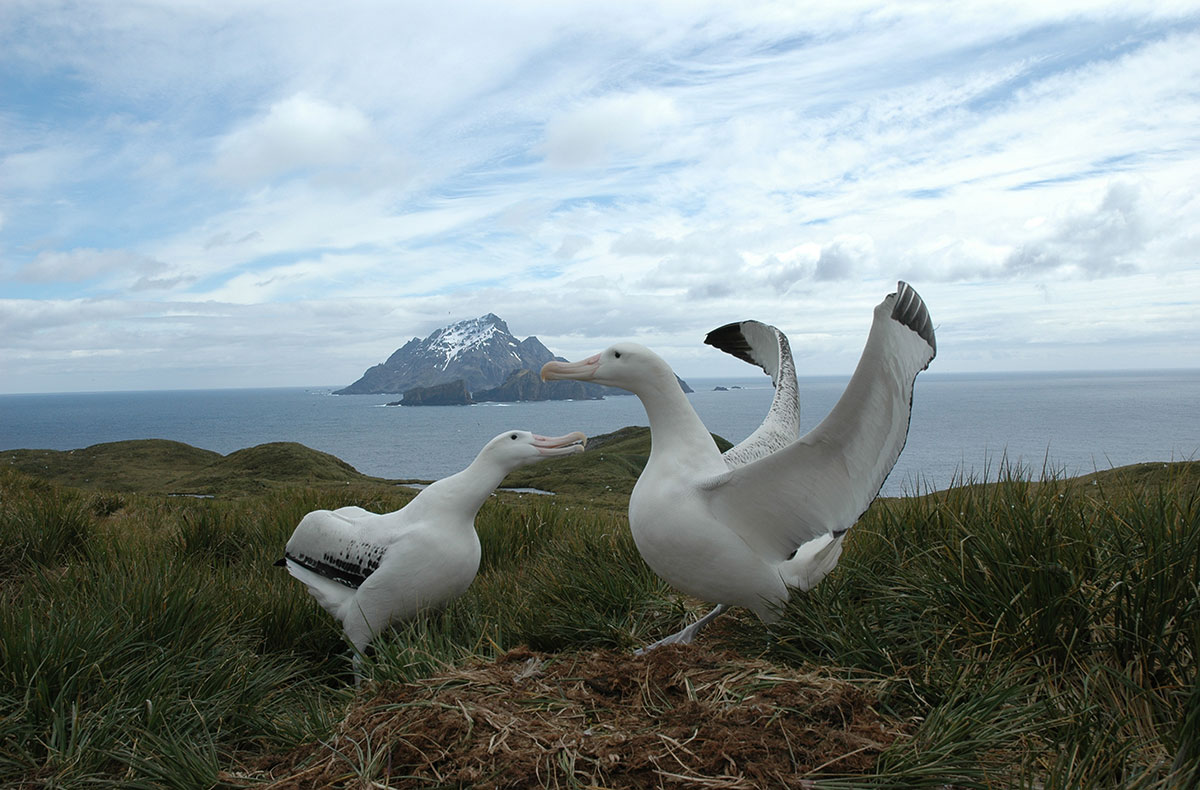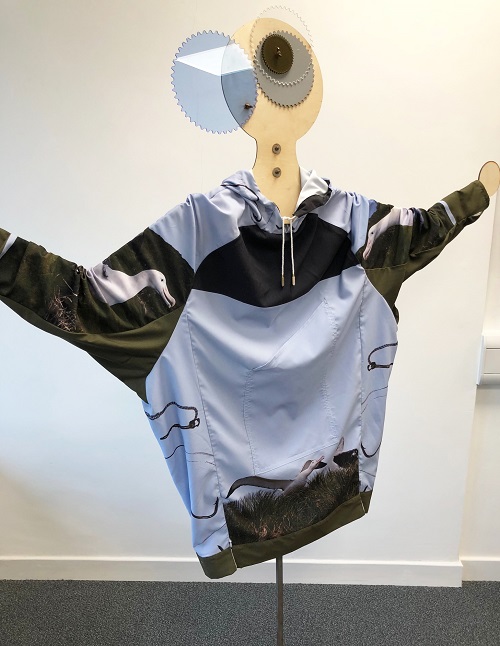News | Wednesday, 17th October 2018
Unique collaboration between fashion designer and British Antarctic Survey on display
Andrea Zapp's garments will be exhibited at the Manchester Science Festival

High fashion meets the Antarctic tundra in a remarkable collaboration between a designer and the British Antarctic Survey (BAS).
Andrea Zapp, fashion designer and Senior Research Fellow at Manchester Metropolitan University, has produced unique garments using BAS data and imagery on everything from wind speeds to animal migration patterns.
The evocative designs colourfully highlight critical environmental issues such as the threat of climate change and endangered species.
The garments form the Ice Queens: Fashion and the Antarctic exhibition at Manchester Science Festival (October 18 to 20, 23 to 27) in a highly visual display that explores how meaning and narrative emerge through clothing.
Zapp’s international fashion design research explores how apparel can be a medium for conveying social, factual or cultural information.

Her windbreaker style garments include those that utilise data on movement and breeding activity patterns of two seabirds, provided by Dr Richard Phillips, leader of the BAS Higher Predators and Conservation group.
One item, inspired by Dr Phillips’ research, shows imagery of the Wandering Albatross combined with a series of used fishhooks, which have been extracted directly from birds’ beaks and nests. The hooks pose a deadly threat to their natural breeding environment.
This vivid illustration demonstrates the increasing and dangerous decline of the Albatross population caused by climate change and the commercial fishing industry.
Longline fishing has now been banned in the Antarctic region following publication of Dr Phillips’ research.
Zapp’s collaboration with BAS – an institute of the British Natural Environment Research Council that delivers research in the Polar Regions – originated in her involvement in the Data as Art initiative.

This involved artists being invited to collaborate with scientists to visualise Antarctic data sets in thought-provoking ways to transmit their message to a wider public audience.
Other designs utilise imagery taken by BAS photographer Pete Bucktrout for monitoring purposes of the Adelie and Macaroni penguins.
The windbreaker style design was supported by research by Emelia Erland, from Northumbria University, to reference climate specifics of the Antarctic region. The design further references Inuit folklore costumes and early Antarctic explorer uniforms.
Visual narrative
Andrea Zapp, Senior Research Fellow in Creative Technologies and Fashion at Manchester Metropolitan University, said: “I am delighted to collaborate with the British Antarctic Survey on this unique project integrating fashion design with environmental research.
“My designs explore the idea that garments can be a screen to convey a visual narrative, cultural meaning and collective memory and association.
“They are inspired by BAS’s powerful nature photography collection and rich data pool that shed light on the pressing issues of climate and habitat change.
“Decorative design and fashion thinking were then applied to present this environmental documentation as wearable artefacts that carry knowledge and an important message.”
Dr Beatrix Schlarb-Ridley, Director of Innovation and Impact at British Antarctic Survey, said: “Bringing polar research to the fore through the medium of art is an excellent way for BAS to engage with and reach new audiences. We’re delighted to be collaborating with Andrea Zapp and showcasing our scientific research data through her creative fashion collection.”
Zapp has worked as a media artist and fashion designer since the mid-1990s, exhibiting her work at festivals, conferences and galleries across Europe, the USA, South America, Asia and Australia. Her work takes a site-specific visual approach to tell stories through design.
She has also established the AZ. label, supported by Manchester Metropolitan University, which is a womenswear and conceptual design label with a strong artistic and research underpinning.
Distinct photography forms the continuum for AZ. designs, which are carefully mapped onto patterns, creating outstanding textures and accentuating garment shapes. Natural landscapes or cities, collectables and everyday finds are captured in transit, providing inspiration for original collection stories and design concepts.
My designs explore the idea that garments can be a screen to convey a visual narrative, cultural meaning and collective memory and association.
The brand has been retailed with Selfridges and in Asia, and has been showcased at the Saatchi Gallery at Scoop/London Fashion Week, Singapore Fashion Week, at Fashion Scout/Paris Fashion Week, and Bunka Gallery Tokyo.
The AZ. design studio is based in the Digital Innovation Centre at Manchester Metropolitan University.
Zapp also researches into the future of fashion and technologies, investigating the potential of future smart fabrics for design purposes and new visual production concepts in fashion and design.




